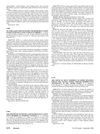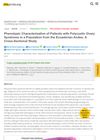 25 citations,
January 2013 in “International Journal of Trichology”
25 citations,
January 2013 in “International Journal of Trichology” Premature balding in some men may be linked to altered hormones, but it's not the male equivalent to polycystic ovary syndrome or metabolic syndrome.
 9 citations,
November 2015 in “Gynecological Endocrinology”
9 citations,
November 2015 in “Gynecological Endocrinology” Different types of PCOS in Chinese Han women show varying levels of male hormone and metabolic issues.

The document concludes that accurate diagnosis and management of PCOS are crucial due to its associated health risks.
 9 citations,
September 2015 in “Reproductive Biomedicine Online”
9 citations,
September 2015 in “Reproductive Biomedicine Online” Longer GGN repeats in the androgen receptor gene are linked to polycystic ovary syndrome.
 19 citations,
October 2012 in “Frontiers of Hormone Research”
19 citations,
October 2012 in “Frontiers of Hormone Research” Lifestyle changes are the first step in treating infertility in PCOS, followed by medications like clomiphene and metformin, and then surgery if needed.
 2 citations,
September 2008 in “Fertility and Sterility”
2 citations,
September 2008 in “Fertility and Sterility” Women with PCOS and higher BMI, especially those with morbid obesity, are at greater risk for depression.
 May 2015 in “Evidence Based Women Health Journal (Online)”
May 2015 in “Evidence Based Women Health Journal (Online)” Inositol was more effective than metformin in improving menstrual cycles and pregnancy rates in PCOS patients.
 20 citations,
January 2008 in “Reproductive Biomedicine Online”
20 citations,
January 2008 in “Reproductive Biomedicine Online” Sexual orientation does not affect the prevalence of PCOS or fertility rates in women undergoing artificial donor insemination.
 88 citations,
May 2012 in “Human Reproduction Update”
88 citations,
May 2012 in “Human Reproduction Update” Women with PCOS may take longer to get pregnant but can have a normal family size, and should manage their overall health to reduce long-term health risks.
 16 citations,
January 2007 in “Journal of Obstetrics and Gynaecology”
16 citations,
January 2007 in “Journal of Obstetrics and Gynaecology” The document suggests various treatments for PCOS, including medication for menstrual issues, insulin resistance, and excess hair, as well as fertility treatments, while highlighting the need for personalized care and lifestyle changes.
 39 citations,
January 2012 in “Reproductive Biology and Endocrinology”
39 citations,
January 2012 in “Reproductive Biology and Endocrinology” About 8.5% of women in Salvador, Brazil, have Polycystic Ovary Syndrome.

PCOS phenotypes A and B are more common and linked to higher health risks in women from the Ecuadorian Andes.
 34 citations,
January 2011 in “Fundamental & Clinical Pharmacology”
34 citations,
January 2011 in “Fundamental & Clinical Pharmacology” New treatments for PCOS show promise, but no current medication treats all aspects of the condition.
 7 citations,
March 2011 in “Hormone and Metabolic Research”
7 citations,
March 2011 in “Hormone and Metabolic Research” Certain gene variations might help protect against insulin resistance and glucose intolerance in people with Polycystic Ovary Syndrome.
 215 citations,
January 2011 in “Reproductive Biology and Endocrinology”
215 citations,
January 2011 in “Reproductive Biology and Endocrinology” About 7% to 15% of Iranian women have polycystic ovary syndrome, depending on the criteria used to diagnose it.
 7 citations,
September 2014 in “Journal of Obstetrics and Gynaecology Research”
7 citations,
September 2014 in “Journal of Obstetrics and Gynaecology Research” Ultrasound measurement of the ovarian stroma to total area ratio is not a reliable single predictor of high male hormone levels in Thai women with PCOS, but works better when combined with clinical signs.
 24 citations,
March 2010 in “Value in Health”
24 citations,
March 2010 in “Value in Health” The PCOS-specific questionnaire needs more work to fully measure quality of life in clinical trials.
 26 citations,
August 2014 in “Genetic Testing and Molecular Biomarkers”
26 citations,
August 2014 in “Genetic Testing and Molecular Biomarkers” High levels of TNF-α may contribute to obesity and insulin resistance in PCOS, but not due to the C850T genetic variation.
 15 citations,
January 2010 in “Reproduction, Fertility and Development”
15 citations,
January 2010 in “Reproduction, Fertility and Development” A certain gene variant may increase the risk of polycystic ovary syndrome in Chinese women.
 1 citations,
July 2014 in “Hormones”
1 citations,
July 2014 in “Hormones” Over a third of women thought to have non-classical congenital adrenal hyperplasia didn't have it confirmed by genetic tests.
 52 citations,
November 2009 in “International journal of gynaecology and obstetrics”
52 citations,
November 2009 in “International journal of gynaecology and obstetrics” High androgen levels in Chinese women with PCOS are linked to a higher risk of diabetes and obesity.
 21 citations,
November 2015 in “Archives of Gynecology and Obstetrics”
21 citations,
November 2015 in “Archives of Gynecology and Obstetrics” Greek women with PCOS have a higher risk of metabolic syndrome and are more likely to be overweight compared to healthy controls.
 18 citations,
March 2014 in “Current Pharmaceutical Biotechnology”
18 citations,
March 2014 in “Current Pharmaceutical Biotechnology” Metformin helps regulate menstrual cycles, induce ovulation, and improve pregnancy outcomes in women with PCOS.
 29 citations,
January 2009 in “Gynecological Endocrinology”
29 citations,
January 2009 in “Gynecological Endocrinology” Women with PCOS have higher levels of certain blood clotting factors, suggesting a greater risk of cardiovascular issues.
 343 citations,
December 2008 in “Endocrine Reviews”
343 citations,
December 2008 in “Endocrine Reviews” Metformin helps with menstrual cycles and insulin levels in PCOS but is less effective for hair growth, diabetes prevention, and weight loss, and may improve fertility and reduce diabetes risk.
 17 citations,
December 2008 in “Dermatology”
17 citations,
December 2008 in “Dermatology” Taking metformin with intense-pulsed-light therapy improves hair removal for people with PCOS.
 37 citations,
January 2008 in “Gynecological Endocrinology”
37 citations,
January 2008 in “Gynecological Endocrinology” Shorter CAG repeats in a specific gene may increase male hormone activity and symptoms like acne and excess hair in women with PCOS.

Resveratrol improved hormone levels, menstrual cycles, hair loss, and ovarian function in PCOS patients.
 38 citations,
January 1997 in “Gynecological Endocrinology”
38 citations,
January 1997 in “Gynecological Endocrinology” Finasteride and flutamide effectively reduce hirsutism in PCOS women, with flutamide also lowering hormone levels.
 16 citations,
April 2007 in “Journal of Obstetrics and Gynaecology Research”
16 citations,
April 2007 in “Journal of Obstetrics and Gynaecology Research” Prostate-specific antigen may be a new marker for excess male hormones in women with polycystic ovary syndrome.






























